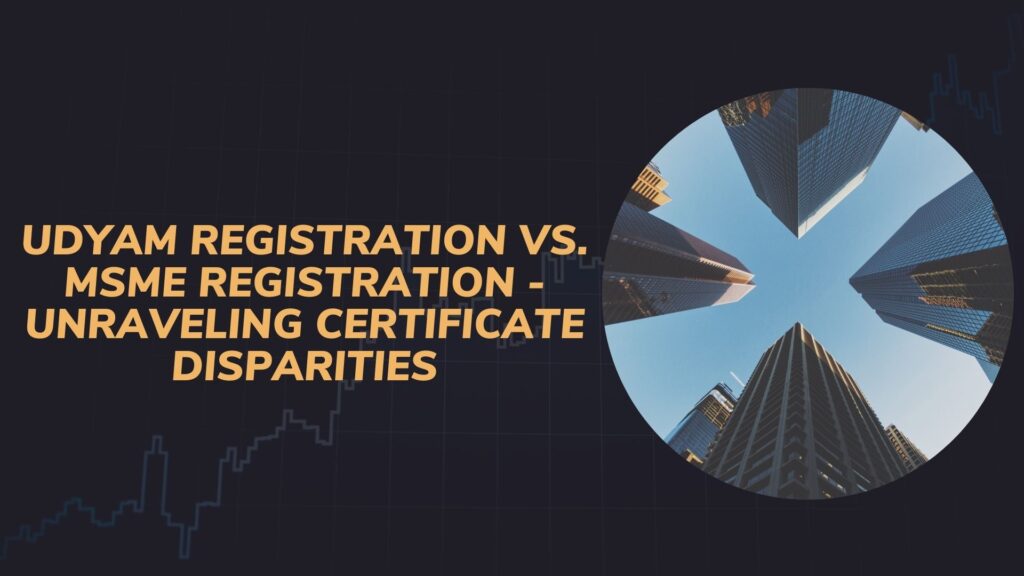Introduction:
In the dynamic realm of business, small and medium enterprises (SMEs) play a pivotal role in fostering economic growth and job creation. Recognizing their significance, governments worldwide have implemented various measures to support and nurture these enterprises. In the Indian context, the Udyam Registration and MSME Registration stand out as crucial mechanisms for businesses to avail themselves of benefits and opportunities. However, as businesses seek these certificates, disparities and nuances emerge, sparking debates about their relative merits. This article aims to delve into the intricacies of Udyam Registration and MSME Registration, shedding light on the certificate disparities that entrepreneurs must navigate.
Understanding Udyam Registration and MSME Registration:
Udyam Registration:
Udyam Registration was introduced by the Indian government as a replacement for the earlier MSME registration process. It is an online process that aims to simplify the registration for micro, small, and medium enterprises. The system categorizes enterprises based on their investment in plant and machinery or equipment, making the classification more nuanced.
MSME Registration:
The traditional MSME Registration was based on the investment in plant and machinery for manufacturing enterprises and the amount of investment in equipment for service enterprises. The registration process was more intricate, involving paperwork and physical submission.
Certificate Disparities:
Criteria for Classification:
One significant disparity lies in the criteria for classification. Udyam Registration considers both the investment in plant and machinery as well as the turnover of the enterprise. In contrast, the traditional MSME Registration primarily focused on the former. This shift in focus may impact businesses differently, especially those with high turnovers but lower investments in machinery.
Operational Differences:
The operational differences between the two systems are notable. Udyam Registration is an entirely online process, providing convenience and speed. On the other hand, MSME Registration involved physical paperwork, potentially causing delays and inefficiencies. The digital transformation brought about by Udyam Registration reflects a broader trend toward streamlining bureaucratic processes.
Validity Period:
Another area of disparity lies in the validity period of the certificates. While Udyam Registration certificates are valid for a lifetime, the traditional MSME Registration requires renewal every five years. This change has implications for businesses, affecting their long-term planning and administrative efforts.
Transition Challenges:
The transition from MSME Registration to Udyam Registration posed challenges for businesses accustomed to the traditional process. Issues such as updating information, understanding the new criteria, and adapting to the online platform created a learning curve for entrepreneurs.
The Impact on Government Benefits and Support:
Understanding the certificate disparities is crucial for businesses, as it directly influences the benefits and support they can avail from the government. Both Udyam Registration and MSME Registration open doors to various schemes, subsidies, and incentives. However, the shift in criteria, especially the inclusion of turnover in Udyam Registration, may alter the eligibility of businesses for specific programs. Entrepreneurs must carefully assess the implications of these disparities to ensure they maximize the advantages available to them.
Financial Implications for Businesses:
The financial implications of Udyam Registration versus MSME Registration cannot be overlooked. The lifetime validity of Udyam Registration offers a sense of stability for businesses, eliminating the need for periodic renewals and associated costs. In contrast, the previous MSME Registration required businesses to allocate resources for renewal every five years. The financial planning of enterprises is directly affected by these disparities, influencing budget allocation and resource management.
Compliance and Regulatory Considerations:
Compliance with government regulations is a cornerstone of sustainable business operations. Udyam Registration, with its online platform, emphasizes digital compliance and record-keeping. This is a departure from the traditional MSME Registration, which may have involved more manual record-keeping processes. Businesses need to adapt to these changes, ensuring they meet the compliance requirements of the updated registration system to avoid legal implications.
Entrepreneurial Adaptability and Education:
The disparities between Udyam Registration and MSME Registration underscore the need for entrepreneurial adaptability and continuous education. Entrepreneurs must stay informed about the evolving registration processes, criteria, and benefits to make informed decisions. Government initiatives, awareness programs, and educational resources play a vital role in equipping businesses with the knowledge needed to navigate the nuances of these certificates effectively.
Future Policy Considerations:
The transition from MSME Registration to Udyam Registration reflects the government’s commitment to modernize and simplify administrative processes. However, ongoing policy considerations are essential to address potential challenges and feedback from businesses. Continuous dialogue between policymakers and the business community can contribute to refining these registration systems, ensuring they align with the evolving needs of the entrepreneurial landscape.
Note: You Can Apply for Udyam Online for Public Limited
Conclusion:
In the evolving landscape of business registration in India, the shift from MSME Registration to Udyam Registration signifies a commitment to digitization, efficiency, and adaptability. However, the disparities between the two systems underscore the need for entrepreneurs to stay informed and navigate the intricacies effectively. While Udyam Registration brings several advantages, understanding the implications of certificate disparities is crucial for businesses seeking to leverage government support and propel their growth. As the business environment continues to transform, staying abreast of registration nuances will be instrumental in shaping the future trajectory of enterprises in India.



